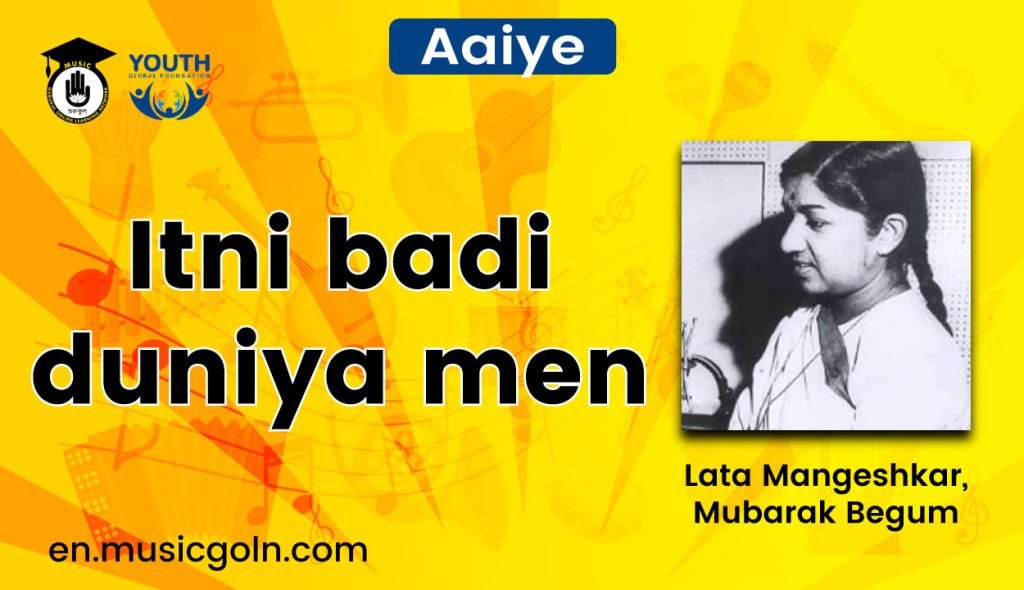Itni badi duniya men lyrics | Lata Mangeshkar | Aaiye | 1949
Singers: Lata Mangeshkar
Music Directors: Shakat Ali Dehlavi (Nashad)
Lyricists: Nakhshab Jarchavi
Composers: Shakat Ali Dehlavi (Nashad)
Nakhshab Jarchavi was born in 1925 in a small town Jarcha,Uttar Pradesh,India.His family name Jarchavi connects him back to his birth town Jarcha.He died on Aug.24,1967 in Karachi,Pakistan.Nakhshab had started his film career back in the 1940’s in Bombay,British India as a film songs lyricist and a film writer.He shot to fame in 1945,when film Zeenat (1945)was released and its Qawwali song became an instant super hit in British India.It was sung for the first time in India, by an all female qawwali singing group including Noor Jehan.
Itni badi duniya men lyrics | Lata Mangeshkar | Aaiye | 1949
Itni badi duniya men lyrics :
Dil ki uljhan apna gham
De aasra isse sahe
Puch ye tha ke
Hoonm mar jaye
Ya jeete rahe
Itni badi duniya mein
Nahi koi humara
Nahi koi humara
Kya tu bhi nahi
Tute hoonye dil ka sahara
Nahi koi humara
Itni badi duniya mein
Nahi koi humara
bharatlyrics.com
Pahlu mein mere
Dil hai magar
Pahlu mein mere
Dil hai magar
Dard se bharpur
Majboor hoon majboor
Duniya ne sataya mujhe
Duniya ne sataya mujhe
Taqdeer ne mara
Kya tu bhi nahi
Tute hoonye dil ka sahara
Nahi koi humara
Tune na suni dard bhare Di…
Lata Mangeshkar (born as Hema Mangeshkar; 28 September 1929 – 6 February 2022) was an Indian playback singer and occasional music composer. She is widely considered to have been one of the greatest and most influential singers in India.Her contribution to the Indian music industry in a career spanning eight decades gained her honorific titles such as the “Queen of Melody”, “Nightingale of India”, and “Voice of the Millennium”.
Lata recorded songs in over thirty-six Indian languages and a few foreign languages, though primarily in Marathi, Hindi, and Bengali.Her foreign languages included English, Russian, Dutch, Nepali, and Swahili.She received several accolades and honors throughout her career. In 1989, the Dadasaheb Phalke Award was bestowed on her by the Government of India.In 2001, in recognition of her contributions to the nation, she was awarded the Bharat Ratna, India’s highest civilian honour;
She was the recipient of three National Film Awards, 15 Bengal Film Journalists’ Association Awards, four Filmfare Best Female Playback Awards, two Filmfare Special Awards, the Filmfare Lifetime Achievement Award and many more. In 1974, she was one of the first Indian playback singers to perform at the Royal Albert Hall in London, UK. Her last recorded song was “Saugandh Mujhe Is Mitti ki” released on 30 March 2019 as a tribute to the Indian Army and the Nation.
At one point, she appeared in the Guinness World Records, which listed her as the most recorded artist in history between 1948 and 1987
Mangeshkar was born on 28 September 1929: 67 in a Maharashtrian Brahmin familyin Indore, (in the present-day Indore district of Madhya Pradesh and then the capital of the princely state of Indore which was part of the Central India Agency in British India). Her father, Deenanath Mangeshkar, was a Marathi and Konkani classical singer and theatre actor.
One of her first major hits was “Aayega Aanewaala,” a song in the movie Mahal (1949), composed by music director Khemchand Prakash and lip-synced on screen by actress Madhubala.This was a defining moment for her, and a catalyst for the recognition of playback singers in India. Before this, playback singers were seen as the vocal equivalent of a stuntman and remained invisible and uncredited. This song was such a big hit, that Radio Goa revealed her identity and she became a star in her own right. This opened the door for other playback singers to achieve the recognition they deserved.
She was the eldest child in the family. Meena, Asha, Usha and Hridaynath, in birth order, are her siblings; all are accomplished singers and musicians
She received her first music lesson from her father. At the age of five, she started to work as an actress in her father’s musical plays (Sangeet Natak in Marathi). On her first day of school, Mangeshkar left because she was not allowed to bring her sister Asha along with her.
Read more:
- Ek naye rang men lyrics | Lata Mangeshkar | Aap ki sewa men | 1947
- Ab kaun sunega mere lyrics | Lata Mangeshkar | Aap ki sewa men | 1947
- Main khili khili phulvari lyrics | Subhadra | Lata Mangeshkar | 1946
- Pyare bapu ki lyrics | Lata Mangeshkar | Sona Chandni | 1946
- Chidiya bole choon choon maina bole hoon lyrics | Lata Mangeshkar | Jeevan Yatra | 1946
